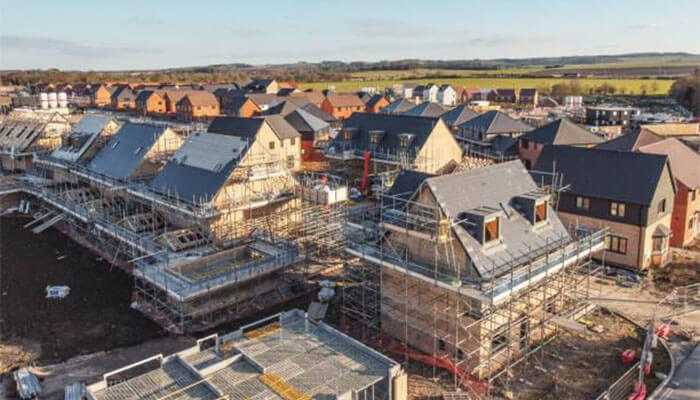The last thing any landlord wants to deal with is an empty wallet in the middle of an intense building project. Considering how hard it’ll be to convince tenants to move into a rental with a half-finished roof, or half-painted rooms, your best bet is to avoid that scenario altogether by managing your money. That’s why we’ve put together this budgeting guide for landlords. Single-family rental construction is a lot of work.
Unlike their multi-complex counterparts, which allow you to spread significant costs like plumbing, roofing, and landscaping across several flats, single-unit homes require personal fittings. As a result, landlords have to be particular about how they spend their money. Stick around as we explore the basics and share helpful tips on budgeting for construction.
Construction Costs for Single-Family Rental Homes
Pre-Construction Costs
1. Permits and Approvals
Many landlords assume their first bill will go to buying materials when, in reality, you start accruing costs before you can even break ground. Depending on your project, most states require a permit to ensure construction sites are in order. The cost often varies from state to state. Thus, it’s vital to ask local authorities about permits and avoid getting slapped with an unnecessary fine.
2. Site Preparation
Building on an empty plot of land can be tricky and requires a lot of prior work before you can lay the foundation. This cost is more common when building from scratch and includes activities like clearing the land and grading.
3. Design and Planning
Before starting construction, you should create a blueprint to guide your workers. While choosing a color palette is an essential component of design, you should prioritize the opinions of architects and engineers who deal with the structure of the house and can ensure longevity. The services of these experts can be expensive, so you’ll need to add it to your pre-construction expenses.
Construction Costs
1. Materials
Materials are often among the most expensive costs landlords must account for during a construction project. However, buying materials like lumber, tiles, and siding in bulk can offset the price, especially if you can secure a great deal. In the long run, better quality increases the longevity and aesthetic of your property.
2. Labor
Hiring skilled workers is often the second most expensive construction expense. Considering its cost, it only makes sense for landlords to prioritize hiring highly skilled workers. However, if you’re embarking on a project outside your usual playground, finding the proper help can be tricky, which is why some property owners outsource. Hire a full-service property manager in Washington DC, that can connect you with the best local contractors and ensure you get the best help.
3. Equipment Rental
You may need to rent heavy machinery and equipment for excavation, lifting, and installation during construction.
Financing Costs
1. Loan Origination
Besides permits and materials, you must also budget for your loan expenses. In other words, the charges you incur from borrowing money. One of the most common is loan origination fees, which landlords pay to initiate the approval process.
2. Interest Payments
Construction often requires several months, and most times, property owners have to make repayments before the project is complete. That means you have to secure income to meet your interest payments on your construction loan.
Tips for Creating a Comprehensive Rental Property Budget
1. Research Thoroughly
Get an accurate estimate of your potential costs before creating a budget. Before commencing a construction project, you might have some ideas of what you want in your head. However, a quick check can help you reevaluate your priorities. Why opt for an expensive slate roof when asphalt shingles are almost as durable? An in-depth research on construction costs can make it easier to select a budget-friendly option.
2. Include Contingencies
Unexpected rental property expenses always arise during construction and rental property management. Ideally, you should allocate a portion of your budget for unforeseen costs. This extra fund can help you avoid delays that can derail your project and extend your timeline.
3. Be Realistic
Aim for quality, but be realistic. There’s no point in purchasing expensive flooring that you can’t maintain in the long run. Instead of breaking the bank, opt for more budget-friendly options that are durable and aesthetic. Also, remember to prioritize low-maintenance materials. Since tenants perform most cleaning duties, it only makes sense that your fittings are easy to clean, even for the laziest renters. Being realistic can significantly reduce the financial strain on your wallet while preventing delays.
Conclusion
Every landlord must use budgeting guides to avoid overspending on their construction projects. When constructing a single-family rental, it would help if you accounted for many things, such as pre-construction costs. Often overlooked, these charges include your permit, site preparation, and expert planning. With a secure blueprint, you can finally break ground and factor in the cost of labor, materials, and rentals. In addition, remember to include financing expenses in your budget.
Some helpful tips for creating a more accurate budget include conducting thorough research, planning for contingencies, and being realistic. These hacks keep your timeline on track and ensure you get the most value for your money. If you’d like more ideas on budgeting, consult an experienced property management company that can offer more advice.



